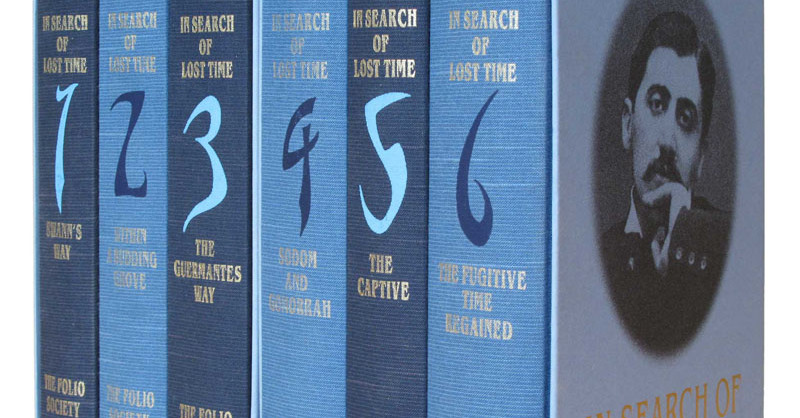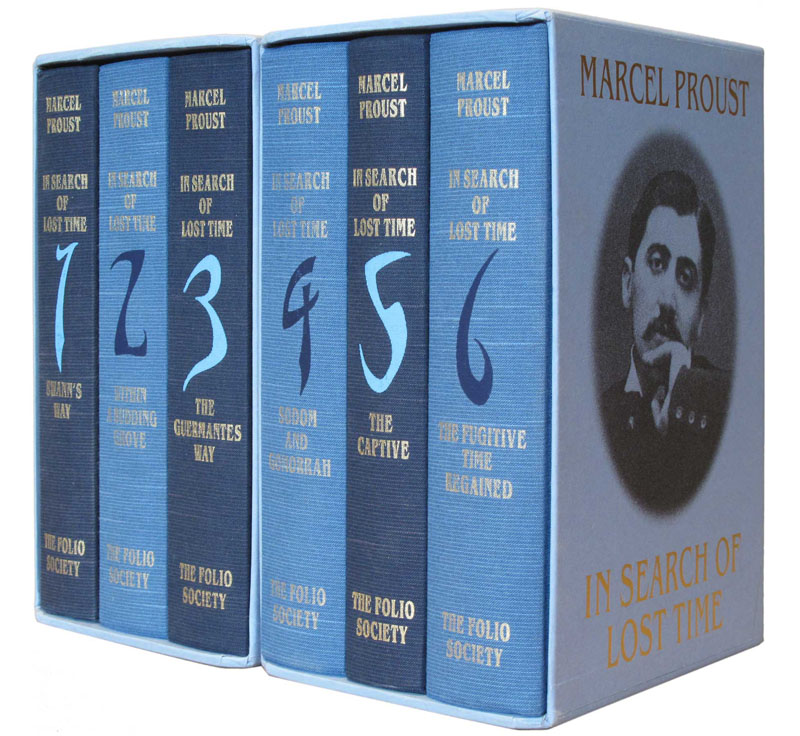What’s the real minority specialist-interest genre of books – the one that bookshops just can’t shift? It’s literary fiction, says Steerforth…
As a bookseller, one of the first lessons I learned when running the fiction section was that the sales of the first volume of Proust’s A La Recherche Du Temps Perdu exceeded the rest of the series put together. Indeed, I’m not sure if I can remember selling any of the other volumes.
Knowing that the first book had evidently bored the arse off so many people put a bit of a dampener on things and even Alain de Botton’s glowing endorsement wasn’t enough to change my mind. But one day I was chatting to a colleague in the unpacking room and he told me that although there were moments that were interminable (he compared the last book to a Ronnie Corbett monolgue), he was really glad that he’d made the effort.
I was almost convinced.
But it would be unfair to single out Proust. As a rule of thumb, the first volumes of novel sequences always sell at least twice as many copies as the remaining titles. The one exception to this is in the fantasy genre where, for better or worse, readers will eagerly devour every volume in the saga.
I suppose we should be grateful that even the first volume of Proust sells. There are plenty of classic novels that never leave the shop and would slowly go yellow with age if they weren’t replaced with newer copies. For example, nobody buys The Scarlet Letter. It may be a classic novel but I can’t remember selling a single copy. I always insisted on stocking it because of its importance in the Western literary canon, but it belongs in the subgenre of novels that nobody reads.
Titles in this category would include:
Cry the Beloved Country
The Ragged-Trousered Philanthropist
Barnaby Rudge
Franny and Zooey
Finnegans Wake
Confessions of an Opium Eater
The Magic Mountain
Mr Norris Changes Trains
The Red and Black
The Magus
The Bone People
The Rachel Papers
Burmese Days
The Leopard
The Ordeal of Gilbert Pinfold
Sons and Lovers
Romola
Room at the Top
One Day in the Life of Ivan Denisovitch
Lucky Jim
Howards End…
The list goes on. Sometimes I tried to rescue these books and promote them locally in the shop. Once I was lucky enough to be able to spearhead a national campaign for ‘Forgotten Classics’ and although the results didn’t quite hit the bestseller charts, I like to think that I was instrumental in introducing some people to Revolutionary Road, Life with a Star and Journey by Moonlight, amongst others.
However I’m under no illusions. As someone pointed out in an article a few years ago, the sales of a Booker-shortlisted novel are always easily exceeded several times over by specialist publications like Anglers’ Weekly. Literary fiction is, it would seem, the real minority interest.
The other week my younger son said that he wanted to be a writer. I felt duty-bound to encourage him, but a nagging voice wanted to say that a lot of books don’t sell, the average salary for an author is £11,000 per year and the man on the Clapham omnibus will probably be more interested in how to catch bream.
If you enjoyed this post, check out:
“Where’s your section of coffee table books on Paraguay?” – And other ridiculous bookshop questions
Bolshy Slackers and Exotic Misfits: Who becomes a Bookseller?













Although my shelves bow under the weight of enough literature to place me firmly in the minority, I know what Steerforth means. For years I could say that the only books by Kingsley Amis I’d read were his letters and a collection of pieces about drink, just as the only ones by Martin Amis I’d read were his memoir Experience and the book he wrote about playing space invaders (well, I didn’t read all of the Space Invaders book – just dipped into a colleague’s copy). In the end I caved in and read Lucky Jim and The Old Devils. I’m glad I did cave in, but some of the stuff on the list wouldn’t even get published today. Would any publisher touch books with titles like The Ordeal of Gilbert Penfold or Burmese Days?
Of that list i’ve managed:
The Ragged-Trousered Philanthropist
Finnegans Wake
Confessions of an Opium Eater
The Magus
The Bone People
The Leopard
Room at the Top
One Day in the Life of Ivan Denisovitch
Lucky Jim
Howards End
I think I actually enjoyed all of them apart from the ragged trousered philanthropist and confessions of an opium eater.
Do you really think no one reads The Leopard? I thought it was almost compulsory for Guardianistas to read it on holiday in Tuscany?
another one in this ‘genre’ I see regularly unloved on charity shop bookshelves would be D M Thomas The White Hotel
You’ve read Finnegan’s Wake? What, all of it?
no … about 1/3, i’m not crazy
Knowing that the first book had evidently bored the arse off so many people put a bit of a dampener on things. True dat, Steerforth, volume one has lurked on our shelves for twenty five years, the Penguin version, two and three can go boil their heads, halfway in, I sat back and thought, ‘the miserable cork encrusted twerp.’ Sitting next to it is another member of the holy grail, Karamazov, more characters than Homeland, requires either a fortitude transplant or a recent redundancy. They are sandwiched between a brace of Turgenev, light, airy, readable.
It’s a pity that Marcel never read Ivan, his search for lost time might have taken place in a different cupboard….“The enchanted world arising out of the dim mists of the past, into which he just stepped, quivered-and disappeared.”
Worm – The Leopard sold better than the others, but it was still disappointing – I suspect that it does better these days, now that the internet is giving the backlist a new lease of life. I’ve sold several old copies since I dabbled in secondhand bookselling.
But as far as the others go, my evidence is both anecdotal and scientific – I’ve analysed the national fiction sales data for a bookshop chain and was horrified to discover that Barnaby Rudge sold a mere eight copies in a year, across 140 shops.
That’s astonishing given the enduring popularity of Dickens. Mind you, an epic BBC Sunday night Barnaby Rudge would boost sales hugely.
Call me weird but I enjoyed the whole of “In Search of Lost Time” but then again it could be that I did not have to suffer that Moncrieff version which put me off in my youth but Kilmartin had me hooked and a reread is scheduled if gardening ever allows.
Sharing accommodation with students on literature courses gave me access and a taste for Dostoyevsky, Forster etc. Fowles was about as modern as they tended to get so I have not really found a taste for the contemporary fiction which fills the lending libraries who have pulped all the classics…
I still sometimes catch myself saying, “Gilbert, for God’s sake stop[!]”* for “Stop”. (I’ve read only four from this list, which also reminds me that I still haven’t read Volumes II and III of The Man Without Qualities.)
*http://books.google.com/books?id=PNOksNAutykC&printsec=frontcover#v=onepage&q=Gilbert%2C%20for%20God’s%20sake%20stop&f=false
For twenty years or so, there was a store in Washington called “Chapters; A Literary Bookshop”, founded by two women who had studied French at Georgetown University. Friends whose taste in reading ran more to philosophy or history claimed that the proprietors would give them reproachful glances on ringing up purchases that were not literary fiction. Chapters is gone now, I regret to say. I don’t think that the remaining independent general interest bookstores in Washington carry a much smaller proportion of fiction, even literary fiction, than Chapters did, though.
And for that matter, philosophy does not sell well, at least in bookstores. A few years ago, The New York Times had an article on the difficulties of bookstores, which remarked that a very large and well thought of bookstore, immediately opposite the University of California’s Berkeley campus, had sold no copies of The Critique of Pure Reason the previous year. I don’t suppose that for extra-curricular reading it has ever challenged most of the books you list, even Finnegans Wake; still I know persons employed outside the academy who will purchase new translations to see whether they are better than the old standby.
Actually, I did not want to emphasize as remarkable the existence of persons who read Kant; I just failed to close the HTML tag.
Politics and Prose is a wonderful bookstore in D.C.